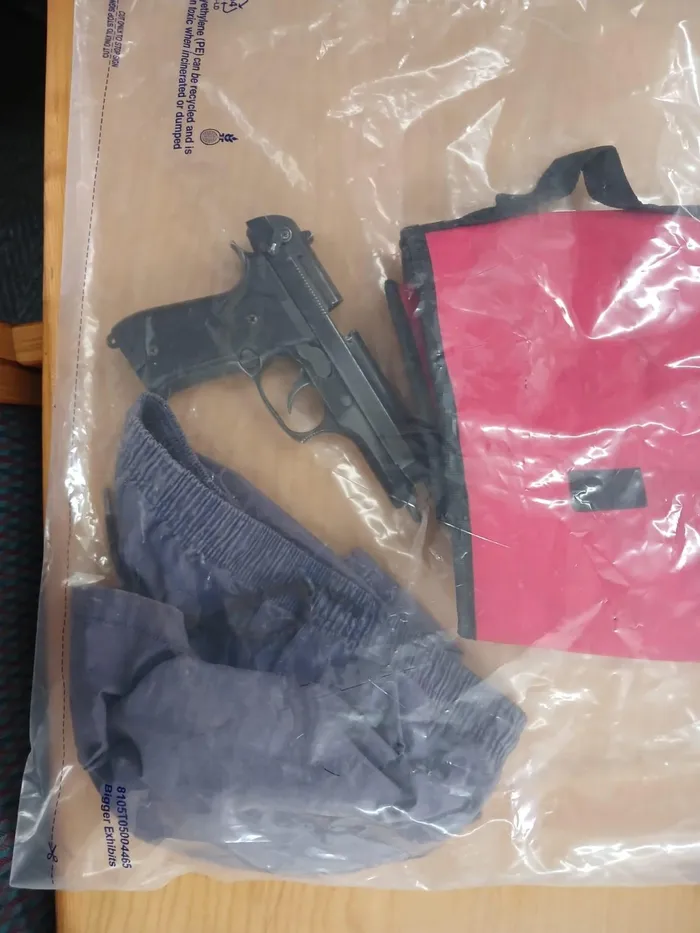Urgent measures: South Africa considers banning blank guns amid crime surge

The government wants to tighten laws on the importation of blank guns as part of its crime prevention measures.
Image: SAPS
Criminals have forced the government to consider banning the importing of blank guns, while there are also plans on the cards to introduce a permit system to reduce their availability.
The SA Police Service (SAPS) has asked the International Trade Administration Commission of SA (Itac), an entity of the Department of Trade, Industry and Competition, to immediately impose controls on the importation of blank guns, which are designed to fire blanks or non-lethal rounds.
Under consideration is the imposition of specific conditions on the issuing of permits for the importation of blank guns or an outright ban on their importation.
In South Africa, blank guns were originally intended for legitimate uses such as training by the SAPS and the SA National Defence Force (SANDF), signalling in sports events, and as props in the film industry.
However, they have increasingly been misused by criminals.
“In particular, there has been a reported increase in the usage of imitation guns and blank guns in the commission of crime in the Western Cape,” the commission stated.
According to Itac’s notice issued this week, there may be several reasons for the use of blank guns in criminal activities, including realistic appearance as they closely resemble real firearms, which makes them effective tools for intimidation during crimes such as robberies or hijackings.
Additionally, it is easy to acquire blank guns because they are more accessible than traditional firearms and can potentially be illegally modified to fire live ammunition, turning them into actual lethal weapons.
The commission has noted that blank guns are among the various weapons used in criminal activities, especially in the commission of contact crimes.
Concerns have also been raised that policing blank guns is made difficult by the fact that they are not currently fully regulated in terms of the Firearms Control Act (FCA).
The SAPS recognises the danger that blank guns pose to public safety and has taken steps to regulate them more strictly.
“Given the use of blank guns in contact crimes, regulating their importation is a logical step toward reducing their availability to criminals. It also aligns with the broader firearm control strategies of the SAPS aimed at reducing gun violence in South Africa,” Itac explained.
Police are considering amending the FCA, a move which is deemed necessary because, historically, blank guns were not regulated under the Act, which means they can be bought easily and carried without a licence.
The proposed amendments to the FCA could include measures placing blank guns in a category similar to conventional firearms in terms of legal oversight, as well as other interventions aimed directly at the importation of blank guns.
Itac said the amendment process is ongoing and will require time to finalise, while blank guns are being used to commit crimes.
“In light of the urgency of the matter, the SAPS approached Itac with a request for the immediate imposition of controls on the importation of blanks guns, such as imposing specific conditions on the issuing of permits for the importation of blank guns or an outright ban on the importation of blank guns,” the notice advised.
Permits or the imposition of an outright ban will serve a multifaceted objective centred on public safety, crime prevention, and effective law enforcement, according to Itac.
Blank guns are technically non-lethal, but some models can be modified to fire live ammunition or projectiles, thus posing a real threat to public safety.
“By controlling or banning the entry of blank guns into South Africa, the government can reduce their role in contact crimes,” reads the notice, adding that modified or even unmodified blank guns undermine public trust and challenge law enforcement agencies’ capacity to respond appropriately.
The commission does not want to ban legitimate uses of blank guns, such as police and military training, while film production companies and private security firms also rely on them for professional purposes.
Itac explained: “An outright ban might materially and negatively impact these sectors. This raises the issues whether a permit system would be a more balanced regulatory approach as it would allow authorities to scrutinise importers and related end-users, ensuring blank guns are only accessible to those with valid and verified needs.”
It is proposing a permit system to import all blank guns into South Africa, and this will entail applicants, whether individuals or legal entities, undergoing identity verification, including submission of certified personal identification documents for individuals, and corporate registration, tax identification, and principal officer information for companies.
Under this regime, individuals or legal entities must declare the intended purpose of the importation.
Training exercises by the SAPS, the SANDF or private security firms, or film production companies will be considered acceptable purposes, but others may be allowed if they do not pose any risk to public safety.
The sale of blank guns will also be banned to an end user unless the end user is a party identified as acquiring them for acceptable purposes.
loyiso.sidimba@inl.co.za
